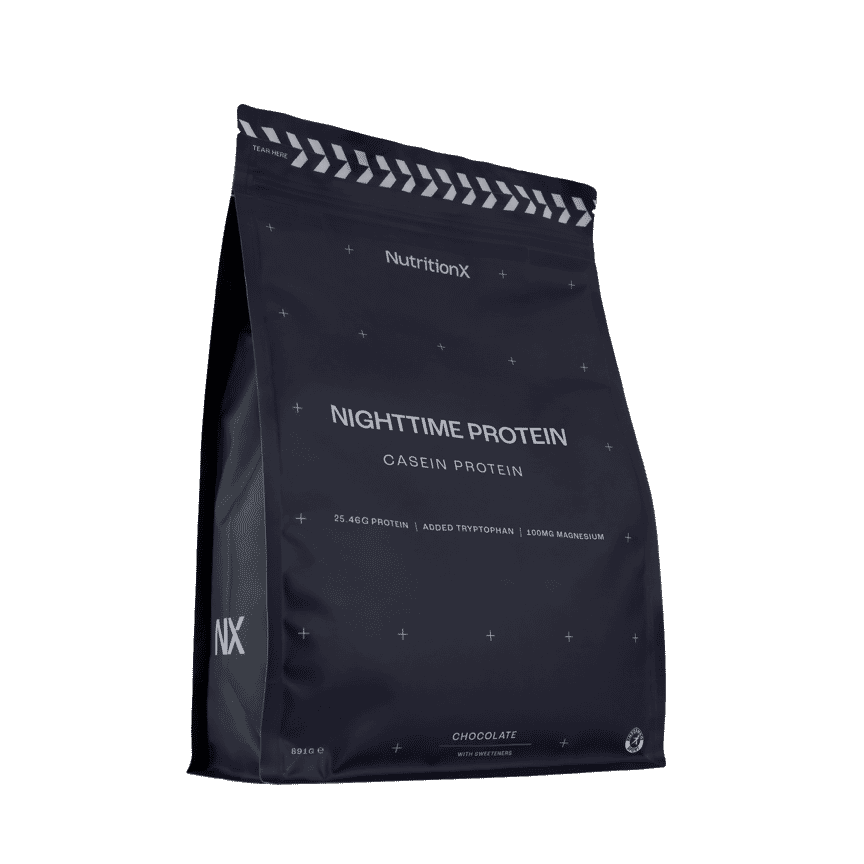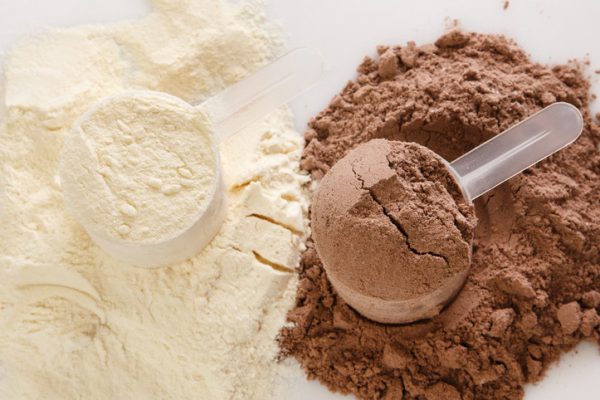Overnight protein is a term often used in sports nutrition to describe protein supplements that are taken before sleep, with the aim of supporting muscle recovery, adaptation and growth during the night. The idea is based on the fact that whilst we sleep, the body continues to repair tissues, adapt to training and - with the availability of amino acids - build new muscle proteins in a process called muscle protein synthesis. But what constitutes an overnight protein, and why should athletes consider it as part of their nutrition strategy?
What is casein protein?
Casein is the main protein found in milk, making up roughly 80 percent of the total protein content, whilst whey makes up the remaining 20 percent. Casein is classified as a complete protein, meaning it provides all of the essential amino acids that the body cannot produce on its own. What makes casein particularly unique is its digestion rate. Unlike whey, which is absorbed rapidly by the body, casein forms a gel-like structure in the stomach. This slows the release of amino acids into the bloodstream, leading to a prolonged supply of nutrients. Research has shown that casein can elevate blood amino acid levels for up to seven hours after ingestion, making it particularly suited to times when long gaps between meals occur, such as overnight (Boirie et al., 1997).

How is casein protein different to whey protein?
Both casein and whey proteins are derived from milk and are high quality sources of amino acids. However, their main difference lies in their digestion speed and their effects on the body. Whey protein is rapidly absorbed, leading to a sharp rise in blood amino acid levels within about 60 to 90 minutes of consumption. This makes whey particularly useful around training sessions, as the rapid delivery of amino acids stimulates muscle protein synthesis effectively. Casein protein, in contrast, digests slowly, steadily releasing amino acids into the bloodstream over several hours. Whilst whey is best for immediate recovery and acute stimulation of muscle growth, casein is better suited for long term nourishment and preventing muscle protein breakdown; especially overnight.
What are the benefits of casein?
Casein protein provides a wealth of benefits, particularly for athletes during training and competition. Firstly, its slow release properties help to reduce muscle protein breakdown during long periods without food. This is crucial for supporting recovery and maintaining lean muscle mass. A study by Res et al. (2012) demonstrated that consuming casein protein before sleep enhanced muscle protein synthesis rates overnight in young men, effectively meaning that casein can help athletes recover more efficiently and adapt better to training over time.
Secondly, casein protein has been linked to improvements in satiety and appetite control. Because it forms a gel in the stomach, it can help athletes feel fuller for longer, which may be useful for athletes aiming to manage body composition or reduce late night snacking. Casein is also rich in bioactive peptides which have been associated with benefits beyond muscle recovery, including potential roles in immune support and cardiovascular health, although more research is needed in these areas.

Who should take casein protein?
Casein protein supplements are a popular option amongst strength athletes, bodybuilders and endurance athletes who want to maximise recovery and preserve muscle mass. It is also commonly used by individuals undergoing calorie restricted diets, as the prolonged satiety it provides can make dieting easier. Essentially, casein can be a useful addition for anyone who wants to ensure their muscles are supported during overnight recovery or during long periods without eating.
Which sports is casein protein beneficial to?

Casein protein is beneficial across a broad range of sports. For strength and power athletes, such as weightlifters, rugby players and sprinters, casein can support muscle growth and recovery between intense training sessions. For endurance athletes, such as cyclists, marathon runners and triathletes, casein provides an important source of amino acids to help repair the muscle damage that accumulates from long distance training. Team sport athletes can also benefit, as their schedules often involve multiple training sessions or matches in close succession, making recovery nutrition vital. Even in sports where weight management is key, such as boxing, wrestling or rowing, casein can help maintain lean mass whilst supporting fat loss. Since fat loss ultimately depends on maintaining an energy deficit, casein may be helpful for athletes in calorie-restricted phases by promoting satiety and helping them better adhere to their nutritional targets.
How should I take casein protein?
Casein protein is most commonly available as a protein powder that can be mixed with water or milk. Many athletes prefer to take it in the form of a shake before bed, but it can also be used in recipes such as overnight oats, yoghurt bowls or protein-rich snacks. Around 20 to 40 grams is considered an effective dose for most athletes, though exact needs vary depending on body weight, training volume and overall protein intake throughout the day. Casein is also available in ready to drink shakes and bars for convenience, although powders provide the most flexibility and adaptability.
When should I take casein protein?
The most common and effective time to take casein is in the evening before bed, 30-60 minutes before sleep. This ensures a steady release of amino acids during sleep, supporting muscle repair and growth at a time when the body naturally engages in recovery processes. Casein can also be useful during the day when a prolonged gap between meals is expected, such as during travel or long work shifts, maintaining satiety and preventing muscle breakdown. However, its main advantage is overnight, especially after a day that includes resistance training. For athletes, combining whey protein around training sessions with casein before sleep provides a comprehensive approach to maximising protein intake and optimising recovery.
Casein vs whey protein - which should I take?
For most athletes, the best approach is not to choose one over the other but to use both strategically. Whey protein is highly effective immediately after training, when the body is primed to absorb nutrients quickly and stimulate muscle protein synthesis. Casein, on the other hand, works best before long periods without food, such as overnight, when its slow digestion and absorption provides sustained muscle support. Athletes who want to maximise recovery and muscle growth should view whey and casein as complementary tools rather than competitors. A practical strategy is to use whey around training sessions and casein prior to sleep, to ensure muscles receive a steady stream of amino acids throughout the day and night.
Check out our casein protein supplements here.







